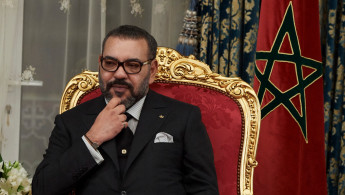Morocco to push for Israeli-Palestinian talks: king
Morocco will push for a resumption of Israeli-Palestinian peace negotiations, King Mohammed VI said on Monday, almost a year after his country renewed ties with the Jewish state.
"Morocco will continue its efforts, building on its position and its excellent relations with all sides and relevant international actors, to provide the appropriate conditions for a return to the negotiating table," the monarch said in a televised address.
Morocco renewed official relations with Israel in December last year, two decades after it cut ties with the outbreak of the second Palestinian intifada or uprising.
The rapprochement came amid a string of controversial normalisation deals between Israel and Arab countries, brokered by the Trump administration.
In a speech, delivered on the UN-organised International Day of Solidarity with the Palestinian People, King Mohammed stressed Morocco's "total solidarity with the Palestinian people" and their right to an independent state alongside Israel.
He called for trust-building efforts and urged both sides "to refrain from actions that obstruct the peace process".
The king, who heads the Organisation of Islamic Cooperation's Al-Quds committee charged with protecting Muslim holy sites in Jerusalem, also warned against any attempt to change the city's "juridicial, historic and demographic" status.
Several cities across Morocco, where public support for the Palestinian cause is high, saw protests on Monday against the move to re-establish ties, according to footage posted on social media.
Authorities banned a planned protest in the capital Rabat.
Protester Mouad El Jouhri, 63, condemned the "betrayal and normalisation with the enemy", referring to Israel.
The king's speech came days after an unprecedented visit by Israeli Defence Minister Benny Gantz, who signed a wide-ranging security pact with the kingdom.
Moroccan opposition groups and Palestinian Islamist movement Hamas condemned the move.
The Fatah movement of Palestinian President Mahmud Abbas called it "a stab in Jerusalem's back".





 Follow the Middle East's top stories in English at The New Arab on Google News
Follow the Middle East's top stories in English at The New Arab on Google News
![Netanyahu furiously denounced the ICC [Getty]](/sites/default/files/styles/image_330x185/public/2024-11/GettyImages-2169352575.jpg?h=199d8c1f&itok=-vRiruf5)
![Both Hamas and the Palestinian Authority welcomed the ICC arrest warrants [Getty]](/sites/default/files/styles/image_330x185/public/2024-11/GettyImages-2178351173.jpg?h=199d8c1f&itok=TV858iVg)
